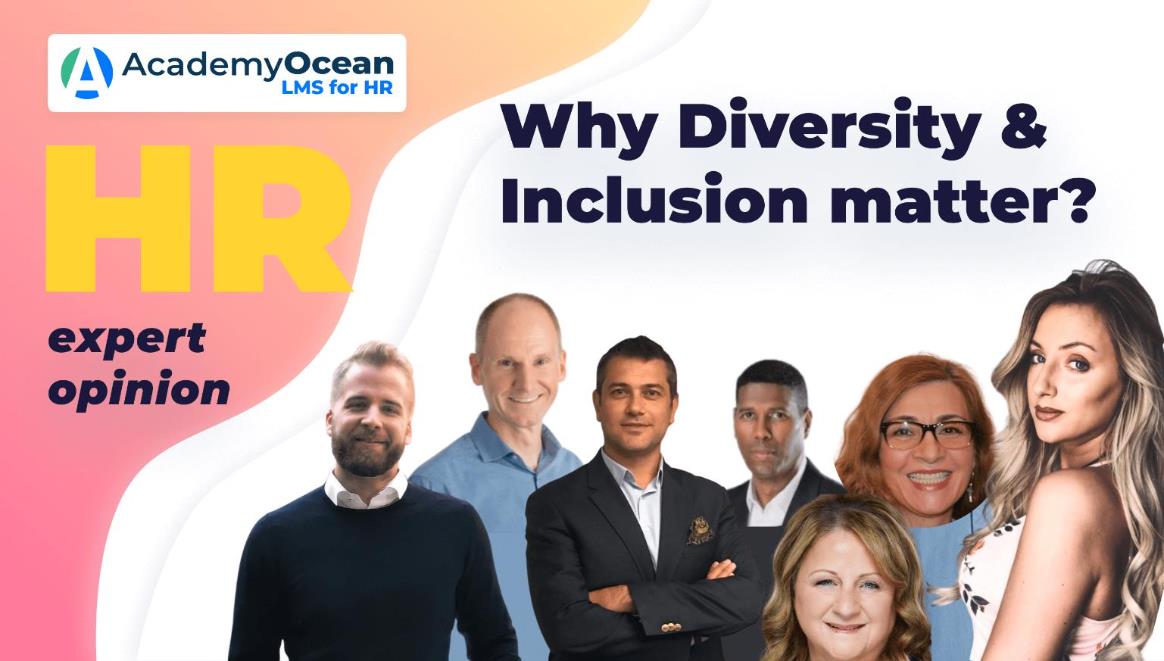Why Diversity & Inclusion matter? HRD experts share their opinion

Diversity and inclusion include more than policies, initiatives, and employee counts. Equitable employers outperform their competition by valuing each team member's individual needs, opinions, and capabilities. As a result, employees are more likely to trust and commit to diverse and inclusive environments.
Highlights:
- The difference between diversity & inclusion
- What is Diversity & Inclusion in the workplace?
- The main ways of improving Diversity & Inclusion in the workplace?
- Why is Diversity & Inclusion in the workplace important?
- Wrapping up
The difference between diversity & inclusion
Diversity and inclusion are two notions that are related but not interchangeable. Diversity refers to an entity's makeup or representation. Inclusion refers to how successfully diverse groups of people's contributions, presence, and opinions are appreciated and incorporated into an environment.

It may be varied, but it is not inclusive. For example, if there are many various genders, ethnicities, nations, sexual orientations, and identities present, but only the perspectives of certain groups are valued or carry any authority or influence, it may be diverse, but it is not inclusive.
What is Diversity & Inclusion in the workplace?
A diverse and inclusive workplace is one in which everyone feels equally included and supported in all aspects of the workplace, regardless of who they are or what they do for the company. The phrase "all areas" is crucial.
Do you recruit from a diverse pool of candidates, have diverse departments and leadership? Or if you operate in an environment where 50% of your employees are female but just 1% of your bosses are female? Do you have a fair number of employees of color in general, but they all work in the same department?
These telling questions reveal true diversity and inclusion in the workplace.
Fikri Kiper, Human Resources Deputy Director Acibadem Healthcare Group, shared his understanding of Diversity & Inclusion:

"A diverse workforce (in age, race, religion, nationality, sexual orientation, and gender) brings diverse viewpoints and perspectives to the company. Having a working environment filled with employees of different backgrounds, skills, experiences and knowledge means that there will be an increase in innovative and creative ideas. This can have a huge impact on the business as this will help the business expand in the long run.
The benefits of diversity include higher revenue, more innovation, better decision-making, higher rates of job acceptance when you make offers to qualified candidates, and better performance than competitors.
The top diversity and inclusion priority is the recruitment of diverse employees. Inclusivity is the key to actually maintaining (not just creating) diversity in the workplace."
Jeroen De Backer, HR Director BE at Renewi, shared other thoughts:

"Within our company, a whole lot of attention is paid to diversity and inclusion. As a company, we want to be a good reflection of the society we are operating in. This surely contributes to a sound understanding of our customers which is crucial in a(ny) client-centric organization.
In addition to this, a few of our core values are innovation, sustainability and together. All of these values have great touching points with diversity and inclusion.
For instance, only when you are able to look at things from different angles you will be able to innovate which will in itself lead to a sustainable organization.
Rather than working with pure quota, we are in the process of creating an organization where diversity and inclusion can thrive. Therefore it is very important to set the tone at the top of the organization and show the example.
Attracting and promoting people from different backgrounds to the senior management level contributes to putting diversity and inclusion further on the agenda of the entire organization. Furthermore, showing the benefits to all of our employees also helps to embrace diversity and inclusion and generates a culture shift where diversity and inclusion can be considered as something fun, very interesting and very close to the values and as such the culture of our company."
HR evolution. Experts about the future development of HR.
The main ways of improving Diversity & Inclusion in the workplace?
To fully disclose the importance of Diversity & Inclusion, the AcademyOcean team decided to learn all the essential facts from experts in this field.
Blanca Freydin, HR director and expert in People & Culture area, shared her thoughts:

"Because D&I initiatives consist of many moving parts, it was necessary for me to find out what areas and aspects needed improvement. To help me get there, I tackled what I considered to be the obvious pitfalls in hindering the embracing of the D&I initiative.
Although this is in no way an exhaustive list, and a myriad of initiatives may be added, I hope you find my initial approach useful:
- Reevaluate the organization’s core values and belief systems
- Reevaluate internal and external forms of communications
- Reevaluate the executive team
- Reevaluate your workforce for knowledge
- Reevaluate your hiring process
If your organization doesn’t already have one, consider implementing a metric system to help you track progress and to record any major hiccups along the way."
Angie Girgis, CEO at Angelic Treasures Christian Daycare Centres, told us:

"The workplace for adults is the same. We are very much in an area where the population of new immigrants is extremely high. It can be challenging at times but ensuring that everyone is respected and that they work hard to do a job that is demanding and that we need to support families is our number goal.
We give our staff opportunities through staff meetings and workshops to gain confidence in dealing with families of different cultures.
I feel that as Operator or even our Supervisor at our center and all of the other centers, we strive to support what the needs of the teachers are.
We encourage staff to bring in their cultural events or special dates or special food and share them with us. Not everyone is forthcoming, but the opportunity is there."
Christian Bengtsson-Rossby, Director Digital HR at Electrolux, shared some ideas with our team:

"The key for me to drive and improve D&I in the workplace is to change the way we look at building teams. When recruiting for my team I always look for two things: the people who have the right mentality and personality, and the people who bring something new and different to the team.
The key to building a high-performing team with the ability to innovate and adapt is diversity. I believe companies have a responsibility to drive a strong D&I agenda to bring this type of awareness to all levels of the company. It is also about poking holes in certain prejudice that exists around diversity.
More importantly, is that companies actively address this topic and bring it up for discussion and ask "why" things are the way they are. We know that historically for example IT and engineering jobs are typically male-dominated roles.
Why is that? To change this old inherited “way” it is important to understand what we as a company and employer need to do to change this. We need to understand how we can create more diversity in these areas and train our managers to understand why it is important to address.
Our responsibility as an employer is to reflect on our employer brand, drive awareness, and promote D&I and unconscious biased throughout our organization.
If we don't, the change will not happen quickly enough."
Why is Diversity & Inclusion in the workplace important?
A diverse and inclusive workplace offers several benefits, according to research:
- Increased sales revenue
- Increased capacity to attract a diversified talent pool
- Increased capacity to attract a diversified talent pool
- Employee retention is 5.4 times greater
One of the most significant elements to employee retention is inclusion at work.
Kristyn Reust, Director of Human Resources, expressed her opinion:

"When thinking about Diversity and Inclusion, it can be easy to get stuck in the same mindset of making sure we are diverse and inclusive of different ethnicities/cultural backgrounds/genders, but Diversity and Inclusion are so much deeper than that.
Each human being has a different personality/traits/characteristics, processes information and emotions differently, and is all on different paths or timelines in their life. We, as employers, have to destroy this barrier of only looking at the surface level of diversity and keep peeling back layers to get to know our staff for each of their unique talents, abilities, and even weaknesses.
One of my favorite quotes is from Alain De Botton and he stated,
"Anyone who isn't embarrassed by who they were last year probably isn't learning enough."
Even if positions in our organization aren't growing or changing, the staff in those positions will be growing and changing through their employee life cycle. I want to be the leader that acknowledges change not only in my organization but within my staff, and helps support change in a positive way to better myself, my organization, and my staff."
Essentials of a Successful Team
Michael Anderson, managing director at Abstract HR, told us:

"Diversity and inclusion are important because the employees who produce your products and services are your most valuable asset. As the population changes and our workplaces continue to diversify, it’s important to ensure that your organization is able to leverage the creative talents and abilities your diverse workforce can provide.
Additionally, failure to value diversity and foster an inclusive work environment might mean the difference between unbridled success and losing market share to one of your more progressive colleagues and competitors.
In the end, those organizations that are equally respectful of their employees and reflect the communities that they serve will enjoy the benefits of diversity and avoid the pitfalls that can lead to an activist backlash, as we have seen so many times in our recent history."
Wrapping up
People are one of the most critical drivers of success in the ever-changing world of business. As the world becomes a global village, your staff will become increasingly diverse in terms of backgrounds, religions, and nations.
Harnessing and blending the thoughts and experiences of this broad group of employees is a significant benefit to your company and a crucial factor of its success.


